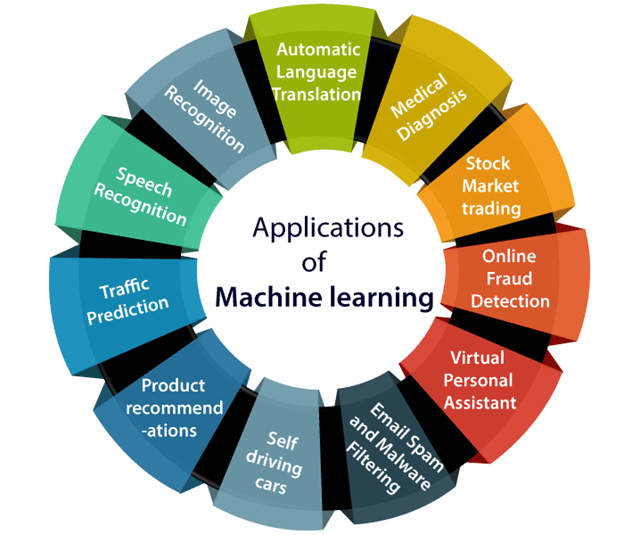Application of Machine Learning

Machine learning has found applications across various industries and domains, transforming the way tasks are performed, decisions are made, and insights are derived. Here are some notable applications of machine learning:
-
Healthcare:
- Disease Diagnosis: Machine learning is used for diagnosing diseases by analyzing medical images (e.g., X-rays, MRIs) and clinical data.
- Drug Discovery: ML algorithms help identify potential drug candidates and optimize drug discovery processes.
- Predictive Analytics: ML models predict patient outcomes, readmission risks, and help in personalized treatment plans.
-
Finance:
- Credit Scoring: ML models assess creditworthiness by analyzing customer data to make more accurate credit decisions.
- Fraud Detection: ML algorithms identify fraudulent transactions and patterns in financial data.
- Algorithmic Trading: ML is applied for developing predictive models for stock price movements and optimizing trading strategies.
-
Retail and E-commerce:
- Recommendation Systems: ML algorithms provide personalized product recommendations based on user behavior and preferences.
- Demand Forecasting: ML models predict product demand, optimizing inventory management and supply chain operations.
- Dynamic Pricing: ML is used to set optimal pricing based on real-time market conditions and customer behavior.
-
Marketing and Advertising:
- Customer Segmentation: ML helps in categorizing customers into segments for targeted marketing campaigns.
- Click-through Rate Prediction: ML models predict the likelihood of a user clicking on a particular ad.
- Sentiment Analysis: ML algorithms analyze social media and customer reviews to gauge sentiment and feedback.
-
Manufacturing and Industry:
- Predictive Maintenance: ML models predict equipment failures, optimizing maintenance schedules and reducing downtime.
- Quality Control: ML is used to detect defects and ensure product quality on production lines.
- Supply Chain Optimization: ML helps in optimizing supply chain processes and logistics.
-
Autonomous Vehicles:
- Object Detection and Recognition: ML algorithms process sensor data for identifying objects and obstacles in real-time.
- Path Planning: ML is applied for planning optimal routes and trajectories for autonomous vehicles.
- Driver Assistance Systems: ML contributes to features like lane-keeping, adaptive cruise control, and collision avoidance.
-
Natural Language Processing (NLP):
- Chatbots and Virtual Assistants: ML-based NLP systems power conversational interfaces for customer support and information retrieval.
- Text Summarization: ML algorithms summarize large volumes of text, extracting key information.
- Language Translation: ML facilitates real-time language translation in applications like online translators.
-
Cybersecurity:
- Anomaly Detection: ML identifies unusual patterns and behaviors to detect potential security threats.
- Malware Detection: ML models analyze code and network behavior to identify and prevent malware attacks.
- User Authentication: ML-based systems enhance security through behavioral biometrics and user authentication.
-
Education:
- Personalized Learning: ML adapts educational content based on individual student performance and learning styles.
- Student Performance Prediction: ML models predict student outcomes and help in early intervention.
- Automated Grading: ML automates the grading of assignments and assessments.
-
Environmental Monitoring:
- Climate Prediction: ML models analyze historical and real-time data for climate modeling and prediction.
- Wildlife Monitoring: ML assists in tracking and monitoring wildlife populations using image and sensor data.
- Energy Consumption Optimization: ML optimizes energy consumption in smart grids and buildings.
These applications demonstrate the versatility of machine learning, and as the field continues to advance, new applications and innovations are likely to emerge.
Thank you,
